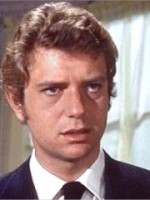John Stride est un Acteur Britannique né le 11 juillet 1936 à Londres (Royaume-uni)

John Stride (born 11 July 1936) is an English actor best known for his television work during the 1970s.
Stride was born in London, the son of Margaret (née Prescott) and Alfred Teneriffe Stride. He attended Alleyn's School, Dulwich, and trained at RADA, where he met his first wife, Virginia Stride (née Thomas).
He made his first, uncredited, screen appearance in the film, Sink the Bismarck! (1960). He also played the role of Bob, the barman, in the film Bitter Harvest (1963), based on the trilogy 20,000 Streets Under the Sky by Patrick Hamilton.
He appeared at the Old Vic as Romeo in Franco Zeffirelli's long-running production of Romeo and Juliet, first staged in 1960, with Judi Dench, and also as Prince Hal in Henry IV, Part 1. At the end of the 1960s he played Rosencrantz at the Old Vic, in the National Theatre Company's production of Tom Stoppard's play Rosencrantz and Guildenstern Are Dead. Stride appeared in two Shakespeare production during the 1970s made for the large and small screen respectively. In Roman Polanski's version of Macbeth (1971) he played the role of Ross. For the BBC Television Shakespeare production of Shakespeare's Henry VIII (1979) he was cast in the lead as the Tudor King.
Meanwhile Stride had developed a career in popular television drama series. In the ITV series The Main Chance (1969-75) he played the solicitor, David Main. It is the television role with which he became most closely associated, and lasted four series. A later series also made by Yorkshire Television with Stride in the lead, Wilde Alliance (1978), lasted for only one series. He also played one of the main parts in the BBC's adaptation of Kingsley Amis's novel The Old Devils (1992).
Source : Wikidata
John Stride

- Infos
- Photos
- Meilleurs films
- Famille
- Personnages
- Récompenses
Nom de naissance John E. Stride
Nationalité Royaume-uni
Naissance 11 juillet 1936 à Londres (Royaume-uni)
Mort 20 avril 2018 (à 81 ans)
Nationalité Royaume-uni
Naissance 11 juillet 1936 à Londres (Royaume-uni)
Mort 20 avril 2018 (à 81 ans)
Stride was born in London, the son of Margaret (née Prescott) and Alfred Teneriffe Stride. He attended Alleyn's School, Dulwich, and trained at RADA, where he met his first wife, Virginia Stride (née Thomas).
He made his first, uncredited, screen appearance in the film, Sink the Bismarck! (1960). He also played the role of Bob, the barman, in the film Bitter Harvest (1963), based on the trilogy 20,000 Streets Under the Sky by Patrick Hamilton.
He appeared at the Old Vic as Romeo in Franco Zeffirelli's long-running production of Romeo and Juliet, first staged in 1960, with Judi Dench, and also as Prince Hal in Henry IV, Part 1. At the end of the 1960s he played Rosencrantz at the Old Vic, in the National Theatre Company's production of Tom Stoppard's play Rosencrantz and Guildenstern Are Dead. Stride appeared in two Shakespeare production during the 1970s made for the large and small screen respectively. In Roman Polanski's version of Macbeth (1971) he played the role of Ross. For the BBC Television Shakespeare production of Shakespeare's Henry VIII (1979) he was cast in the lead as the Tudor King.
Meanwhile Stride had developed a career in popular television drama series. In the ITV series The Main Chance (1969-75) he played the solicitor, David Main. It is the television role with which he became most closely associated, and lasted four series. A later series also made by Yorkshire Television with Stride in the lead, Wilde Alliance (1978), lasted for only one series. He also played one of the main parts in the BBC's adaptation of Kingsley Amis's novel The Old Devils (1992).
Le plus souvent avec
Filmographie de John Stride (11 films)
Acteur

La guerre d'Hanna (1988)
, 2h28Réalisé par Menahem Golan
Origine Etats-Unis
Genres Drame, Guerre, Biographie
Thèmes Religion, Politique, Religion juive
Acteurs Ellen Burstyn, Maruschka Detmers, Anthony Andrews, Donald Pleasence, David Warner, Rade Šerbedžija
Rôle Dr. Komoly
Note60%





1939. Avec la montée du nazisme, Aniko Senesh devient sioniste et part en Palestine où elle prend le nom d'Hanna. Entraînée par la Haganah, elle est parachutée en Yougoslavie mais arrêtée par les allemands en Hongrie. Torturée, elle ne parlera pas, mais l'arrivée imminente des russes lui vaut d'être exécutée sans jugement...

Le Couteau sur la nuque (1985)
, 1h27Réalisé par Lou Antonio
Origine Etats-Unis
Genres Policier
Acteurs Peter Ustinov, Faye Dunaway, Diane Keen, Bill Nighy, Jonathan Cecil, David Suchet
Rôle Film Director
Note61%





Hercule Poirot fait la connaissance sur un plateau de télévision de l'acteur Bryan Martin et de sa future partenaire à l'écran Jane Wilkinson, qui s'avère être en réalité Carlotta Adams, une imitatrice. Ils sont tous invités chez la véritable actrice qui apprécie le talent de Carlotta. Jane demande à Poirot d'intercéder en sa faveur auprès de son mari, Lord Edgware, pour obtenir son consentement en vue d'un divorce. Ce dernier assure à Poirot avoir pourtant déjà donné son consentement par écrit quelques mois plus tôt. Peu après, Lord Edgware est retrouvé mort.

Oh Chien Celeste ! (1980)
, 1h44Réalisé par Joe Camp
Origine Etats-Unis
Genres Thriller, Comédie, Fantasy, Policier
Thèmes Mise en scène d'un animal, Religion, Mise en scène d'un chien, Films pour enfants
Acteurs Chevy Chase, Jane Seymour, Omar Sharif, Robert Morley, Alan Sues, Lorenzo Music
Rôle Alistair Becket
Note54%





Browning est un PI avec un mauvais rhume, qui est envoyé pour enquêter sur un cas par un client mystérieux. Il tombe par hasard sur le corps d'une jeune femme et est poignardé à mort, et quand il se réveille dans le ciel, ils lui dire qu'il est « matériel marginal », et ils ne peuvent décider de sa destination finale par une dernière mission: revenir en arrière et résoudre son propre assassiner. Comme un chien. Un petit chien mignon pelucheux (Benji). Sans se laisser démonter, Browning commence à enquêter sur l'affaire comme il le peut autour de son handicap canin (composant le téléphone présente un défi particulier) pour résoudre les meurtres, sauver la jeune fille, et voir que justice soit faite.
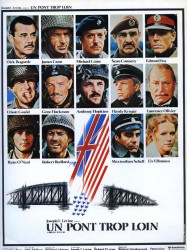
Un pont trop loin (1977)
, 2h50Réalisé par Richard Attenborough, Sidney Hayers
Origine Etats-Unis
Genres Drame, Guerre, Action, Aventure, Historique
Thèmes Pont, Politique
Acteurs Dirk Bogarde, James Caan, Michael Caine, Sean Connery, Michael Byrne, Edward Fox
Rôle Grenadier Guards Major
Note73%





En septembre 1944, les Forces Alliées en Europe sous le commandement du général Eisenhower essaient de trouver un moyen de finir la guerre au plus tôt, sachant que l'allongement des lignes de ravitaillement depuis la Normandie rend difficile la poursuite de l'avancée vers l'Allemagne. L'opération Market Garden, conçue par le général anglais Montgomery, tente un coup d'audace sans précédent : parachuter plusieurs divisions aéroportées britanniques et américaines derrière les lignes allemandes, afin de capturer plusieurs ponts stratégiques qui permettront aux troupes terrestres de franchir le Rhin et de pénétrer directement en Allemagne. L'attaque combinée des forces aéroportées (Market) et du XXXe corps blindé britannique (Garden) doit permettre de percer le front sur une profondeur de 100 km, et d'atteindre la ville d'Arnhem, aux Pays-Bas, située sur la rive du Rhin, derrière le troisième pont à prendre.

La Malédiction (1976)
, 1h51Réalisé par Richard Donner
Origine Etats-Unis
Genres Thriller, Fantastique, Horreur, Policier
Thèmes L'enfance, Religion, Diable
Acteurs Gregory Peck, Lee Remick, David Warner, Billie Whitelaw, Patrick Troughton, Leo McKern
Rôle Psychiatrist
Note74%





Robert Thorn est ambassadeur des États-Unis à Londres. Plusieurs décès tragiques et étranges ont lieu dans son entourage. Keith Jennings, un photographe, et le père Brennan finissent par convaincre Thorn que Damien, son fils de cinq ans, un orphelin aux origines obscures qu'il a adopté le jour de sa naissance à l'insu de sa femme, celle-ci venant de mettre au monde un enfant qui est mort peu après sans aucune explication, n'est autre que l'Antéchrist.

Brannigan (1975)
, 1h51Réalisé par Douglas Hickox
Origine Royaume-uni
Genres Drame, Thriller, Action, Policier
Acteurs John Wayne, Richard Attenborough, Judy Geeson, Mel Ferrer, John Vernon, Ralph Meeker
Rôle Insp. Traven
Note60%





Un policier américain, envoyé à Londres pour arrêter un criminel, se trouve obligé de collaborer avec la police anglaise qui utilise des méthodes radicalement différentes des siennes.

Terreur sur le Britannic (1974)
, 1h49Réalisé par Richard Lester
Origine Royaume-uni
Genres Thriller, Action, Policier
Thèmes La mer, Le terrorisme, Transport, Film catastrophe
Acteurs Richard Harris, Omar Sharif, David Hemmings, Anthony Hopkins, Shirley Knight, Ian Holm
Rôle Hughes
Note65%





Alors que le paquebot Britannic entame une croisière devant le mener d'Angleterre aux États-unis, un homme se faisant appeler « Juggernaut » (Freddie Jones) téléphone à Nicolas Porter (Ian Holm), directeur de la Sovereign Lines à qui appartient le Britannic pour lui annoncer qu'il a placé plusieurs bombes à bord. Après une petite explosion sur le pont du navire destinée à prouver qu'il est sérieux, Juggernaut exige une forte rançon afin de donner le moyen de désamorcer les bombes. Le temps étant exécrable, il n'y a aucun espoir de mettre les canots à la mer. Le commandant du Britannic (Omar Sharif) ne pouvant faire accepter le paiement de la rançon par les autorités, va devoir accueillir à bord une équipe de démineurs parachutée en pleine mer. Le chef des démineurs, Fallon (Richard Harris), homme exubérant et fantasque mais très compétent, va se heurter au commandant à la suite du décès de son meilleur homme et ami, Charlie (David Hemmings), lors de la tentative de désamorçage d'une des bombes. Alors que l'équipage et les passagers bien que terrorisés essayent de garder bonne figure, Fallon dépassé par la complexité des engins demande de l'aide à distance à un vieil ami, Sid Buckland, ancien démineur comme lui. L'heure fatale approche et les passagers s'apprêtent à embarquer dans les canots malgré les risques. Pendant ce temps, la police, arrivée chez Buckland se rend compte que Juggernaut et lui sont la même personne. Ils l'emmènent alors afin de parler à Fallon qui est arrivé à isoler le cœur de la bombe. Seul Juggernaut peut aider Fallon à franchir la dernière étape du désamorçage. Malgré leur amitié et ses prières, Juggernaut indique à Fallon la mauvaise manière mais celui-ci, soupçonneux, va, à la dernière seconde, choisir de lui-même et ainsi sauver sa vie, le bateau et ses occupants.

Something to Hide (1972)
, 1h39Réalisé par Alastair Reid, Alastair Reid
Origine Royaume-uni
Genres Drame, Thriller, Policier
Acteurs Peter Finch, Shelley Winters, Colin Blakely, John Stride, Linda Hayden, Harold Goldblatt
Rôle Sergeant Tom Winnington
Note56%





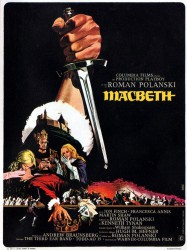
Macbeth (1971)
, 2h20Réalisé par Roman Polanski
Origine Royaume-uni
Genres Drame, Guerre, Historique
Thèmes Théâtre, Politique, Adaptation d'une pièce de théâtre, Adaptation d'une pièce de théâtre de William Shakespeare, Royauté
Acteurs Jon Finch, Francesca Annis, Bernard Archard, Terence Bayler, Sydney Bromley, John Stride
Rôle Ross
Note73%





Macbeth et Banquo, deux chefs de l'armée de Duncan, roi d'Écosse, reviennent d'une campagne victorieuse. Sur la lande, ils rencontrent trois sorcières. Celles-ci prédisent à Macbeth un titre de Baron de Cawdor ainsi que celui de futur roi d'Écosse tandis qu'à Banquo, une descendance royale. Peu de temps après, deux messagers viennent alors informer Macbeth de l'honneur que lui fait le Roi en le nommant baron de Cawdor.
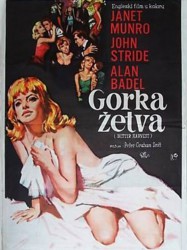
Bitter Harvest (1963)
, 1h36Réalisé par Peter Graham Scott
Origine Royaume-uni
Genres Drame
Acteurs Janet Munro, John Stride, Alan Badel, Dame Thora Hird, Vanda Godsell, Richard Thorpe
Rôle Bob
Note60%





Jennie Jones hails from the countryside when she decides to the travel to the big city. There, she is continually befriended by the wrong crowd and finds herself down on her luck and ultimately contemplating her own demise.
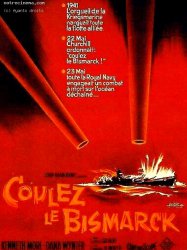
Coulez le Bismarck ! (1960)
, 1h37Réalisé par Lewis Gilbert
Origine Royaume-uni
Genres Drame, Guerre, Action, Historique
Thèmes La mer, Transport, La bataille de l'Atlantique, Politique
Acteurs Kenneth More, Peter Burton, Dana Wynter, Carl Möhner, Laurence Naismith, Edward R. Murrow
Rôle Tom Shepard, Captain Shepard's son, TAG - Ark Royal's Swordfish Squadron (uncredited)
Note71%





L' histoire de l'un des plus célèbre combats navals de la seconde guerre mondiale. Durant le printemps 1941, le Bismarck, le cuirassé le plus célèbre de l'Allemagne nazie, est coincé dans un port norvégien. Il parvient à s'échapper et est pris en chasse par la Marine anglaise. Commence alors une poursuite anthologique, un combat à mort sur l'océan déchaîné...
 Connexion
Connexion



